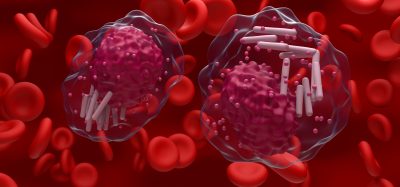MUTYH variants implicated in a broader range of cancers
Posted: 28 March 2024 | Drug Target Review | No comments yet
The discovery that one missing copy of MUTYH could increase the risk of cancers may lead to therapeutics against solid tumours.


Researchers from The Johns Hopkins Kimmel Cancer Center and the Johns Hopkins Bloomberg School of Public Health and Foundation Medicine have discovered that a gene associated with colorectal cancer seems to also be linked to the development of other solid tumours. To date, this is the largest analysis to investigate whether a single mutated copy of MUTYH also affects the risk of developing cancer.
It has been known since the early 2000s that inheriting two mutated copies of the gene MUTYH leads to a 93-fold increased risk of colorectal cancer and is a major cause of that cancer in individuals younger than 55. Lead author Dr Channing Paller, director of prostate cancer clinical research and associate professor of oncology at the Johns Hopkins University School of Medicine, commented: “We know two missing copies of MUTYH greatly increases the risk of colon cancer, and now it appears that having only one missing copy may lead to a small increased risk of other cancer types.”
MUTYH encodes an essential enzyme in the base excision repair (BER) pathway, which repairs DNA damage in human cells. Routine DNA damage is not repaired when the BER pathway isn’t working, resulting in additional DNA mutations or cell death.
Dr Paller has co-led PROMISE, a genetic registry of patients with inherited mutations in prostate cancer, since 2021. One of her patients had one defective copy of MUTYH instead of two, and asked if this affected his aggressive prostate cancer, but there was not enough data on MUTYH variants to answer the question. There were conflicting results in previous studies about whether a single, heterozygous mutation of MUTYH might predispose a person to cancer.
To find a definitive answer, Dr Paller worked with a team at Foundation Medicine, a Massachusetts-based genomic profiling company that maintains one of the world’s largest cancer genomic databases. Dr Paller, with researchers at Foundation Medicine, Dr Alexandra Maertens, of the Center for Alternatives to Animal Testing at the Bloomberg School of Public Health; and others, applied an advanced algorithm to analyse the genetic data of 354,366 solid tumour biopsies stored in the Foundation database.
Within that population of tumour samples, 5,991 had one working version and one mutated version of MUTYH. Of those, 738 had lost their working copy of the gene, leaving them with just the mutated copy. Tumours with a single, mutated copy of MUTYH showed a genetic signature of additional genetic mutations and a defective BER pathway. Individuals with that genetic signature had a modest increase in susceptibility to a subset of solid tumours, including adrenal gland cancers and pancreatic islet cell tumours. Despite this, they did not have an increased risk for breast or prostate cancer, resolving the original patient’s question.
Dr Paller added the results suggests that MUTYH variants might be involved in a broader range of cancers than previously known. “The next question is whether this finding has therapeutic implications,” she concluded. “Can we target the BER pathway for possible drug sensitivities?” If this is possible, this could enable a new therapeutic approach against solid cancers.
This study was published in JCO Precision Oncology.
Related topics
Cancer research, Drug Targets, Genetic Analysis, Oncology, Therapeutics
Related conditions
Breast cancer, Cancer Research, Colorectal cancer, Prostate cancer








